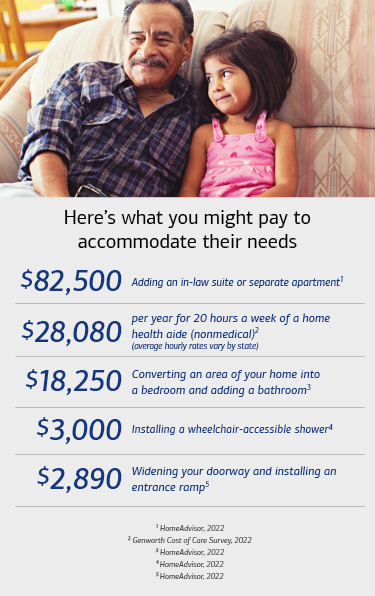Looking after elders can put a disproportionate burden on women, who often wind up shouldering the bulk of in-home care, notes Cynthia Hutchins, director of financial gerontology at Bank of America. “Women sometimes wind up cutting back on work in order to manage elder care, which can affect their ability to advance in their career and save for retirement,” she notes. One answer for both men and women managing caregiving needs is hiring in-home help, but that can be expensive. Your local Area Agency on Aging, a non-profit designated by your state to provide elder care resources and services, can also be very helpful.
To make in-home care more affordable, consider pooling your resources — which also alleviates the burden on one specific household, as was the case with my wife’s grandmother. Having siblings or cousins contribute a set amount to a joint account every month can be much easier than dividing expenses on a one-off basis, says Mejía. It can also save the designated bill-payer from having to go to everybody for a handout every time an invoice comes in.
While some families choose to have older relatives under the same roof, others may prefer providing them with a nearby house or apartment. That gives the parents a measure of independence while making it easier for you to help when needed. Make sure your parents or older relatives have a chance to express their preference. For example, my father, independent and happy with his pension at age 84, has decided he wants to live on his own as long as he can.
Treasure all the special moments
Above all, remember to treasure all the special moments that happen when aging family members are an integral part of your life. When I think about Hispanic-Latino families, I think about the weekly ritual many have maintained for generations: Sunday lunch at the parents’ or grandparents’ house. It’s a noisy gathering that includes siblings, everyone’s kids, aunts, uncles, cousins and so on. It’s also a deeply reassuring tradition and one that generally doesn’t end when one generation gets too old to host it. It simply shifts to someone else’s home — yours, or one of your siblings’, and maybe someday your own kids’.
Taking care of elders as they age is a continuation of that tradition in our culture. As Correa puts it, “Being able to help your elders is not just an obligation but a joy.”
Iván Rothkegel is a freelance writer and translator covering Latin American and business and finance issues at many publications, including The Wall Street Journal. He is not affiliated with Bank of America Corporation or any of its subsidiaries.


 “No one tells you that you have to take care of your parents. It’s just what we do.”
“No one tells you that you have to take care of your parents. It’s just what we do.” “Many families prefer having elderly parents move in with them rather than entering a care facility. That can require a bigger house.”
“Many families prefer having elderly parents move in with them rather than entering a care facility. That can require a bigger house.”
